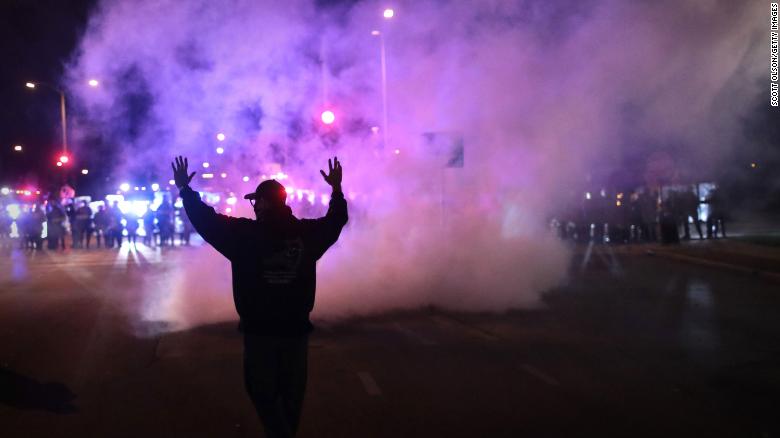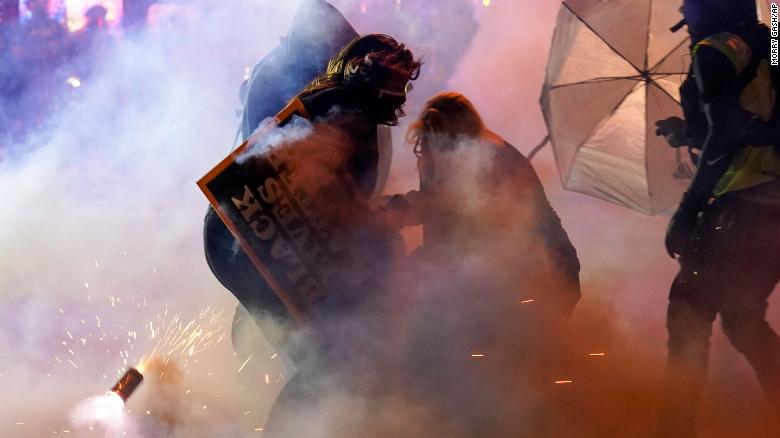Groups focused on abortion rights spend big amid SCOTUS fight

Since President Donald Trump’s nomination of Amy Coney Barrett to the Supreme Court, the possibility of overturning Roe v. Wade looms larger. Barrett is not shy about her anti-abortion stance and signed an ad in 2006 that called the 1973 landmark decision “barbaric” and a “raw exercise of judicial power.”
In fear or excitement, both the pro-abortion rights and anti-abortion groups have funneled money into this year’s elections. While more donations are yet to come, totals haven’t reached 2018 levels, when the confirmations of conservative Justices Neil Gorsuch and Brett Kavanaugh to the Supreme Court were front of mind.
Through September, pro-abortion rights groups gave $4.5 million to candidates, party committees and outside groups, six times more than their anti-abortion counterparts. While the 2020 election cycle isn’t over, donation numbers from the 2018 midterm election were higher. Two years ago, pro-abortion rights groups advocates gave a record $8 million to candidates and groups.
Those who support Roe v. Wade are using their money to help elect Democrats. Pro-abortion rights groups gave primarily to three Democratic nominees: $564,000 to Joe Biden, $77,000 to Maine’s Sara Gideon and $73,000 to Arizona’s Mark Kelly.
Biden has taken a strong pro-abortion rights stance in recent years, though he has swung back and forth on his the issue since 1973, when he entered the Senate and Roe was decided. In a town hall Monday, Biden said if Barrett was confirmed and Roe was overturned, “the only responsible response to that would be to pass legislation making Roe the law of the land.” His running mate Sen. Kamala Harris (D-Calif.) echoed that sentiment in Wednesday’s vice presidential debate, saying, “I will always fight for a woman’s right to make a decision about her own body. It should be her decision and not that of Donald Trump and the vice president, Michael Pence.”
The pair are supported by pro-abortion rights committees such as EMILY’s List, which is dedicated to supporting pro-abortion rights women in office. The conduit PAC has spent $58 million so far this cycle and its affiliate group, Women Vote! has spent $24.2 million. Of that, $2.8 million went to supporting Biden, whereas almost $7 million was used against Sen. Susan Collins (R-Maine) and Sen. Joni Ernst (R-Iowa). Just last week, the super PAC joined other women-led groups to pledge $10 million in digital ads supporting Harris leading up to Wednesday’s debate.
National women’s health organization Planned Parenthood has also backed pro-abortion rights candidates. Along with its affiliate super PACs in many states, Planned Parenthood has spent $6.1 million this cycle. In the presidential election, the group has spent $1.3 million against Trump and almost $1 million supporting Biden.
It’s also released several six-figure digital ad campaigns this summer attacking vulnerable GOP senators. The group’s largest target this election are two women senators from opposite sides of the country. Planned Parenthood has spent $633,000 against Collins and $582,000 against Sen. Martha McSally (R-Ariz.). Collins faces a tight race this year in part because of her views on abortion. Though the incumbent has said she supports abortion rights, Mainers protested her vote to confirm Justice Kavanaugh two years ago. McSally, on the other hand, is staunchly anti-abortion and has repeatedly voted to defund Planned Parenthood.
The oldest abortion rights advocacy group in the U.S., NARAL Pro-Choice America, has spent $1.7 million thus far, mostly against Republicans. In April, the group launched a six-figure ad campaign titled Pro-Life Hypocrisy with videos saying pro-life Republican congressional members “want to put Americans at risk by ending social distancing.” It has particularly attacked McSally, Sen. David Perdue (R-Ga.) and Ernst.
All three candidates are anti-abortion and support Barrett’s nomination. In January, Ernst signed an amicus brief petitioning the Supreme Court to reconsider Roe v. Wade. Just last week, at a debate she said she is “proudly pro-life,” but added that even if Barrett is confirmed, she doesn’t think Roe v. Wade will be overturned. “I don’t see that happening,” she said.
Want first access to OpenSecrets' investigations and data features? Learn about Article Alert.
Anti-abortion groups push for Barrett confirmation
A 2019 study by the Pew Research Center found that 70 percent of U.S. adults oppose completely overturning Roe v. Wade, while 28 percent support overturning it. A CBS News poll this summer returned similar results.
Those findings haven’t stopped anti-abortion groups, which donated $742,000 to candidates and groups this election. That is actually far less than previous cycles. Political contributions from anti-abortion groups have declined almost every cycle since 2012.
Most of this year’s money came from the Susan B. Anthony List, which gave $83,000 to Republican candidates. The conservative PAC backed Trump and several incumbents in toss up elections, including Sen. Ernst, Steve Daines (R-Mont.) and Lindsey Graham (R-S.C.).
Susan B. Anthony List and its partner super PAC, Women Speak Out PAC, are spending $500,000 in Iowa to re-elect Ernst. This week they put out phone, digital and text ads to inform voters of Barrett’s pro-life views and preserve the pro-life Senate majority. Last week, they released a video supporting Barrett, who would “give our pro-life country the court it deserves.”
Although Women Speak Out said it has a $52 million budget this election cycle, the super PAC has spent only $4.7 million through October 2020. The super PAC heavily targeted candidates in Texas, North Carolina and Michigan. It spent almost $765,000 attacking five house Democrats in Texas: Candace Venezuela, Sri Kulkarni, Lizzie Fletcher, Colin Allred and Wendy Davis.
The group has also used $1 million to support Trump and almost the same amount to attack Biden. Right before the Democratic National Convention in August, it released a video calling Biden and Harris “pro-abortion fanatics.”
Much like his oppnonent, Trump has also waivered on the issue of abortion rights. In 1999, he said “I am pro-choice in every respect,” a line used against him in attack ads just four years ago. In office, the president has reversed course and is eager to overturn Roe v. Wade. This January, Trump was the first sitting president to attend the March for Life, an annual rally protesting abortions and the Roe v. Wade decision.
At Wednesday’s vice presidential debate, Pence said, “I couldn’t be more proud to serve as vice president to a president who stands without apology for the sanctity of human life. I’m pro-life, I don’t apologize for it.”
Another anti-abortion group, Right to Life, has spent $377,000 this election helping Republicans. The group spent $177,000 backing Trump, $41,000 for Thom Tillis (R-N.C.) and $35,000 for Michelle Fischbach, the Republican nominee in Minnesota’s 7th District. Over the summer, the group posted several ads on Facebook attacking Democrats in Congress for their pro-abortion rights views. Currently, they’re running an ad primarily targeting voters in Florida, Pennsylvania, North Carolina and Michigan.
Whether or not Roe is overturned, state legislatures could pass laws designed to protect abortion rights much like those passed in 2019 in Illinois and New York. Just last Friday, New Jersey Gov. Phil Murphy announced a similar law, the Reproductive Freedom Act, which protects abortion rights in the Garden State. States could also pass laws in hopes of banning abortion during the first trimester. Alabama and Georgia legislatures have attempted to pass such laws, but the laws are still working their way through the court system and have been blocked from taking effect.
/cdn.vox-cdn.com/uploads/chorus_image/image/67609563/GettyImages_1013360990.0.jpg)








